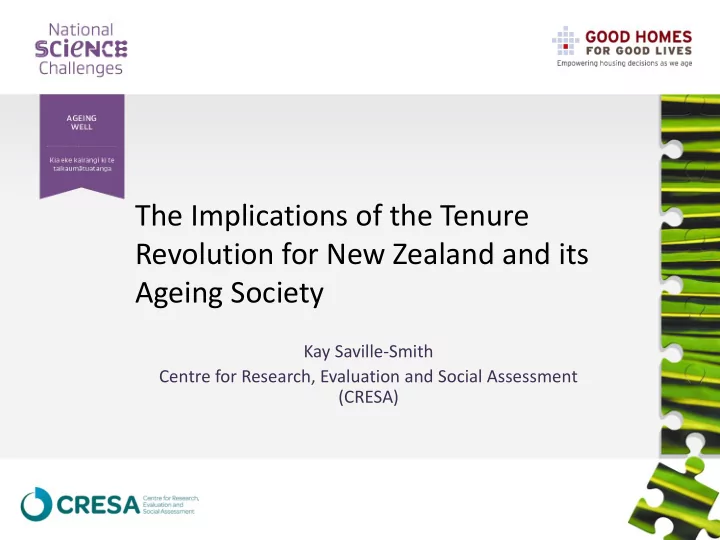

The Implications of the Tenure Revolution for New Zealand and its Ageing Society Kay Saville-Smith Centre for Research, Evaluation and Social Assessment (CRESA)
Big, Big Changes • Increasing ratio of older to younger • Widening inequalities • Cultural and ethnic diversity • Globalisation • Tenure revolution
Back to the Thirties Falling Home Ownership – Dwellings (excluding Family Trusts but including Retirement Villages)
Diverse Older People – Different Trends • For 80+ yrs • Ageing at home • Possibly a small retirement village affect. • Legacy of home ownership policy and affordable housing • For 65-79 yrs: • Previously renting • Moving to rental • Out of private into non-private dwellings
Housing Experience of Future Older Population • Can not be ‘read’ from the overarching experience of: • The older population now, or • Earlier cohorts of baby boomers • A sense of possible implications can be grasped from: • The experiences of old and young renters • A raft of research around: • Living standards • Downsizing • Retirement villages • Housing markets and sectors
What We Know • H/O has underpinned older people’s: • Living standards • Health outcomes • Life chances • Contributions to social and economic life • Rental tenure is associated with: • Insecurity • Poor house performance • Marginal affordability • Retirement village sector: • Affordability issues • Business model fragility
What Will Be Affected? Lots! • High, mortgage-free homeownership among older people frames: • Retirement incomes policy and settings • Health policy particularly: • In-home care • Home modifications • Residential care settings and funding • Current housing delivery assumes older people have housing wealth: • HNZ gives low priority to older people • Local government pensioner housing in decline and affordability issues • Community housing sector: • Does not target older people • Paralysed by policy and legislative confusion • Retirement village expansion
Will rental dominance: • Incentivize and precipitate higher dependency and rest home care? • Constrain access to or drive up costs of: • In-home care? • Modifications? • Home-based treatment? • Change tastes and capacity to give and receive affective support in different cultural settings, places and households? • Generate an age-friendly rental sector and rental stock?
Ageing Well Science Challenge – Tenure Revolution Research • Component 1: Housing tenure transitions • Cohort analysis and who, where and what of the tenure revolution. • Component 2: Tenure, in-home and residential care transitions – Asks are older renters • More likely to move (and/or move earlier) into residential care? • Less likely to access in-home care? • Less likely to access home modifications. • Component 3: A National P erspective on Older Renters in Policy, Planning and Services – Cross-sectoral reviews and a national landlord survey. • Component 4: Case Studies – Place- based, tenant, Māori, Pacific, and Chinese new settlers. • Component 5: Learning to Adapt – Foresight methods and charrettes to: • Explore alternative development paths and their probabilities; • Generate consensus about the practices and services needed • Develop tools, models and best practice that allow services to assess and adapt current services, practices, and procedures
Ageing Well Science Challenge – Tenure Revolution Research Mission-Led Science N ATIONAL S CIENCE C HALLENGE A GEING W ELL Researchers from CRESA, Public Policy & Research, Katoa Ltd, Auckland University, Natalie Jackson Demographics, and Victoria University Learning More www.ageingwellchallenge.co.nz www.cresa.co.nz www.goodhomes.co.nz
Recommend
More recommend